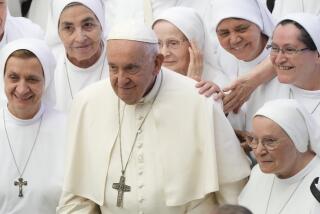Vatican Appeals for Debt Relief for Third World
- Share via
VATICAN CITY — In a broad appeal to save heavily indebted Third World countries from bankruptcy, the Vatican asked the world’s developed countries Tuesday to adopt an “ethics of survival” and organize an emergency rescue effort that would surpass the Marshall Plan of the postwar years.
“Without drawing a parallel with what was done after World War II to accelerate the reconstruction and economic recovery of countries seriously damaged during that conflict, is it not imperative to start working on a new system of aid from the industrialized countries to the less prosperous ones. . . ?” the Vatican asked in a statement on the problem of international debt.
The 27-page statement, setting ethical guidelines for governments, international financial institutions, banks and multinational companies in the effort to cope with the Third World debt crisis, was prepared at the request of Pope John Paul II by the Pontifical Commission for Peace and Justice. It was made public Tuesday with the pontiff’s approval.
It is the first systematic proposal on world finance ever published by the Vatican, although its authors disclaimed any intention by the church of suggesting specific plans “outside her field of competence.” Instead, the authors said, the Vatican’s intention is “to set out the ethical principles and indicate the primary applications.”
The thrust of the document is a plea to the governments of developed countries as well as to international institutions such as the International Monetary Fund and the World Bank and to private banks and multinational companies to be more forgiving in dealing with underdeveloped countries that are struggling under unbearable burdens of debt.
“Respect the insolvent debtor and do not burden him with immediate and intolerable demands which he cannot meet,” the statement said. “With the Gospel as the source of inspiration, other types of action could also be contemplated such as granting (loan) extensions, partial or even total remission of debts or helping the debtor to regain solvency.”
While stressing the responsibility of wealthy states and institutions to cooperate in an international rescue effort, the document also inveighed against irresponsible spending, corruption and waste on the part of the debtor nations. Warning them to avoid putting full blame for their problems on other countries, the document asked leaders of the developing countries to open themselves to scrutiny for such faults as “negligence . . . tax fraud, corruption, currency speculation, national capital reserve drain, kickbacks in international contracts. . . .”
Cardinal Roger Etchegaray, the French churchman who heads the Pontifical Commission, said that the Vatican document, entitled, “At the Service of the Human Community: An Ethical Approach to the International Debt Question,” is being sent to government, economic and financial leaders throughout the world. He called the debt problem “grave, urgent and complex.”
The Vatican statement did not single out any specific countries, but it did mention both the International Monetary Fund and the World Bank as bearing “very concrete responsibility in the area of emergency measures.”
“In numerous cases,” it said, “the IMF’s decisions have been ill-received by the leaders and the general public of countries in difficulty; the decisions in question may seem to have been imposed in an authoritarian and technocratic way without due consideration for urgent social requirements and the specific features of each situation.”
More to Read
Sign up for Essential California
The most important California stories and recommendations in your inbox every morning.
You may occasionally receive promotional content from the Los Angeles Times.












